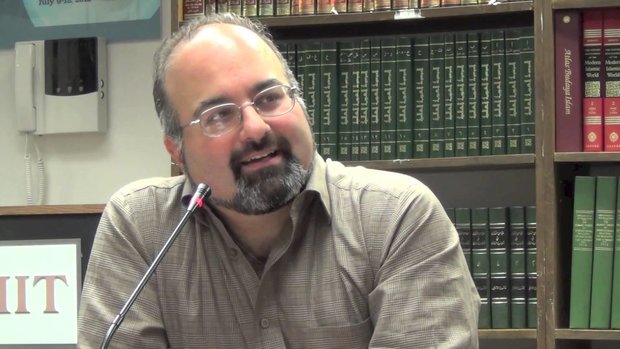ID :
430737
Tue, 01/03/2017 - 12:55
Auther :
Shortlink :
https://oananews.org//node/430737
The shortlink copeid
Islam religion of mercy, Prophet mercy to whole universe

Interview by Mohammad Mazhari
TEHRAN, Jan. 03 (MNA) – Iranian academician has said that western powers and their Arab allies in the region are merely seeking their own interests while fueling the sectarian tensions in the Middle East.
With the advent of extremist fundamentalists with a claim on Islam and who however commit the most abominable acts of atrocity in the name of the same religion, western circles seeking the flimsiest of pretexts to discredit the very religion of Islam through depicting a violent and irrational image of it, came to the fore to exploit the opportunities thus created. The sectarian strife within Islam fueled even further by countries supporters of terrorism provides a grim image of the religions the Messenger brought as a religion of peace 14 centuries ago to unify the Ummah and to bestow mercy upon the downtrodden and the oppressed of the world. His recommendation for Muslims was to deal others even enemies out of mercy.
Mr. Omid Safi, a professor of Asian and Middle Eastern Studies at Duke University sat with our correspondent earlier this week to address the roots of the extremism and contributing factor to their utterly lurid nature of atrocity which hit for the most part the world of Islam; Mr. Safi believes that destructive contribution of the western powers and their Arab allies seek merely their parochial interests through an ideology equally monolithic in interpretation of the scriptures, which countenances sectarian rift and allow such atrocities with no qualms.
You have formerly pointed out that tensions in Islamic world are not ideological or theological but are due to geopolitical competitions between powers. Can you explain your idea?
In the Muslim majority countries, there is a competition that connects to geo-political interests. We see a coalition of Iran/Russia/Syria on one hand, and a Turkey/Saudi/United States on the other hand, though Turkey is also now moving closer to Russia. In other words, it is not enough to see this as a mere “Sunni/Shi’a” conflict, but often predicated by these geopolitical elements. I wrote an article about this last year.
Can we suppose that the advent of extremist groups such as ISIS in our modern era supports Max Weber's idea on development of Islam by Muslim warriors who sake this-worldly religion? Or we must take into consideration sectarian divisions in Islam and suppose these groups just as an exception?
No, I think these kinds of groups are more complicated. They are actually nihilistic groups, unlike classical Islamist groups that wanted to establish Islamic states, they offer merely death and destruction with no clear path of building a state. I don’t see them as “this-worldly”, and certainly not “other-worldly”, but rather what happens when religion is emptied of all mercy, tenderness, and intellect.
Do you agree that terrorist groups are result of poverty and marginalization of religious people in modern societies? Is that a kind of a reaction to capitalization and marketization of everything?
Not at all. It has been long established that there is no direct correlation between poverty and religious extremism. I tend to look to more historical and political factors: so on one hand, groups like ISIS have a clear link to the Wahhabi influenced interpretation of Islam espoused by Saudi Arabia. They are also jihadist in their orientation, armed and fueled by hyper-militarized societies. But there is also a blame that has to be assigned to Western regimes. When the United States illegally invaded Iraq and destroyed the cursed regime of Saddam Hossein, they did so without a plan for nation-building, or even rudimentary understanding of the very complex country they were occupying. So they fired thousands of officers and soldiers from the Ba’thist regime, who then had no plan for employment. Many of these military folks re-assembled under the auspices of ISIS. So as you can see, it is not enough to blame this on poverty, or one set of factor. We need to be able to account for multiple set of factors and historical circumstances.
In your point of view, how can Muslims get united? And is it possible or practical despite of theological differences between Muslims?
Absolutely. Nationalism poses a serious challenge, especially when it is wed to both geopolitical interests, sectarianism, and the “divide and conquer” policies of the West. I hope that unity will come not as uniformity: the diversity of Muslim interpretations and practices is in and by itself not a negative. But we have so much to offer one another, as long as we refuse the siren call of politicians from inside and outside of the Muslim-majority world who insist on dividing us.
In a word, what is legacy of Prophet Muhammad for Muslims and the whole world?
Mercy. Above all, Rahmat. In an age when people are killing one another over who is a part of the “community of Muhammad” (Ummat-e Muhammadi) and who loves the family and companions of the Prophet (Al-e Muhammad va Ashab-e Muhammad), who quickly we have forgotten that the Prophet is above else a Mercy not just to this world, but to all the universes that exist and could exist. This is the meaning of “wa ma arsalnaaka illa rahmatun lil ‘alamin.” He is truly the “Nabi-ye Rahmat”, the very embodiment of God’s qualities of mercy and compassion and all. We should start with that, and always ask whether any word, any thought, any action confirms to the meaning of mercy, love, tenderness, justice, and compassion as embodied by the Prophet or not. May we become worthy of bearing the fragrance of the Prophetic qualities, insha’allah.
Professor Omid Safi is a Professor of Asian and Middle Eastern Studies at Duke University. He is also the Director of the Duke Islamic Studies Center.





